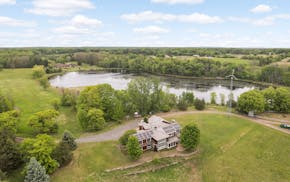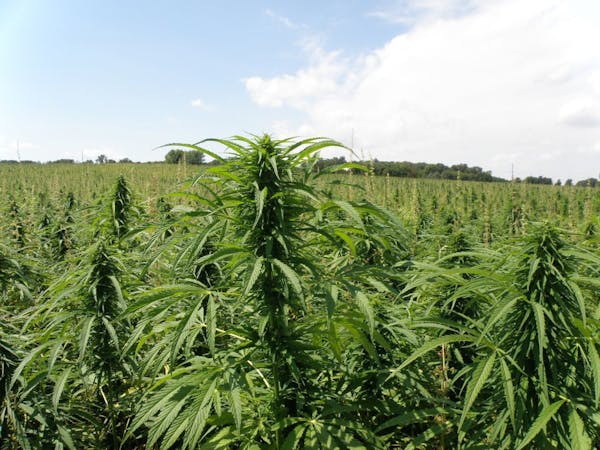Lanesboro, Minn. – Luis Hummel last week loaded his 2019 hemp crop — his second and his last — on a truck bound for a CBD processor in Colorado.
After just two growing seasons, Hummel fell on the wrong side of the legal tightrope farmers must walk to raise hemp. A cannabis concentrate he produced that contained too much THC led to criminal charges and an agreement with state regulators that he exit the business "in 2020 and thereafter."
"It is what it is, but I got my crop," Hummel said.
Hemp farming drew heavy interest from Minnesota farmers as corn and soybean prices flatlined and a fast-growing market for CBD oil emerged from nowhere. More than 500 growers and processors secured licenses under the state's industrial hemp pilot program last year.
But the business is perilous. The legal chemical in hemp that's driving demand, CBD or cannabidiol, is intertwined with the intoxicating chemical that remains illegal by federal law, THC or tetrahydrocannabinol.
Seed technology is in its infancy. The rules give farmers little room for error. Thirty growers in Minnesota were ordered to destroy their crops in 2019 after they tested too high for THC. But even as the state Department of Agriculture ordered farmers to burn or bulldoze their fields, it beseeched the federal government to loosen new rules set to take effect later this year.
"You can't expect the private sector to follow laws that different enforcement agencies don't agree on," Hummel said. "That's just common logic."
Hot or cold crop
The market for CBD oil took off after Congress passed a 2018 farm bill that distinguished hemp from marijuana, meaning the plant was no longer considered a controlled substance if the amount of THC in it was low enough.
While the industrial hemp grown for fiber and grain doesn't produce much of either THC or CBD, the plants used to generate the in-demand CBD oil for dietary supplements and topical creams trace their lineage to strains that were bred to get people high, said George Weiblen, a plant biologist at the University of Minnesota who studies hemp.
The federal limit for THC in a hemp crop is 0.3%. Strains of smokable marijuana, which is illegal in Minnesota and most states, run around 20%. The recreational vape oil sold legally in Colorado, California and other states can run at 80% THC.
Hummel, 32, settled in Lanesboro in 2016, and bought 5 acres of land clinging to a bluff overlooking the Root River. In 2018, he planted 1.5 acres of hemp under Minnesota's pilot program.
His problems started last March when a man who had agreed to sell his products for him, Brandon Cole, was pulled over for speeding, and had cannabis concentrates that tested at more than 3% THC.
Hummel told investigators in Fillmore County he knew the concentrates, produced from his 2018 hemp crop, needed to be diluted, perhaps with coconut oil.
Hummel was eventually charged with felony drug possession and sale in Fillmore County, and the Minnesota Department of Agriculture revoked his industrial hemp license and ordered him to destroy his 2019 crop. Hummel refused and sued the department. The agency settled with Hummel in early February, allowing him to keep his crop if it tested below the 0.3% THC threshold.
"I have never had a hot crop," Hummel said. "I did get levels up in the 3% range, but that's always going to happen with a concentrate."
His 2019 crop, which had been in storage, tested under the 0.3% limit before he shipped it to Colorado last week.
Weiblen said much of the hemp that's cultivated for CBD oil in the state would test high for THC in concentrate form. "If the processing doesn't isolate the THC from the CBD, it can happen," he said.
But just the process of isolating THC from CBD is against the rules, since a THC concentrate is a Schedule I controlled substance by federal law.
Weekly tests
CBD processors want hemp that's at least 15% CBD, Weiblen said. In order for a plant to produce that much CBD, it needs to be a cross between industrial hemp and a potentially high-THC marijuana plant.
"The market for CBD demands that farmers work with marijuana-hemp hybrids rather than certified industrial hemp seed," Weiblen said. "THC and CBD are so closely related, so similar chemically, that if you produce a lot of CBD you're going to produce THC as a byproduct."
New research from Cornell University confirms that genetics is the main reason hemp crops go hot.
The longer a farmer leaves the plant in the ground, the higher the CBD content, but also the higher the THC content. Hemp farmers in Minnesota last year had to test their plants continually and tried to time the harvest to maximize CBD content without surpassing the legal limit for THC.
The Minnesota Department of Agriculture advises growers to test their fields "weekly" when the fields are flowering in late September and early October, and the field must be tested in a 30-day window before the harvest.
"The goal is to harvest at the time when the hemp is at the peak CBD levels, but still under 0.3% total THC," the agency said.
Failure on the first try
Steve Bernard didn't get the timing right. A retired electrician who grows and transplants trees along the south fork of the Zumbro River west of Rochester, Bernard saw hemp as a way to grow a crop close to his home, experiment with something new, and maybe make a little extra money in retirement.
He bought seeds from a dealer in Oregon and planted one acre in 2019, his first year in the program. His growing license cost him $350 and the seed and other inputs cost $2,500.
The hemp went hot. He thought maybe it had to do with how much nitrogen he applied to the field. Or maybe the seed company he bought from ripped him off.
"Nobody at the state can tell me why it got hot," Bernard said. "I called the University of Minnesota to see how much nitrogen I should apply. They said, 'I don't know, call the University of Wisconsin,' and they said, 'I don't know, call the University of Colorado.' That's the infancy of this thing."
Even destroying the crop became a hassle. Hemp is too strong to cut down with a lawn mower, so Bernard used a skid loader and put it in a compost pile. Then, he asked state officials whether he could use it as animal bedding. "They ran it up and down the ladder," he said. "I could use it for horses, but not for cows because they might eat it like they do the ditch weed."
He says the company that sold him seeds in 2019 has promised him free seeds in 2020, and he'll plant them if they come.
"There's a lot of old Drug War mentality in this thing, and maybe that's confusing people," Bernard said. "I'm trying to grow hemp for CBD oil. Period."
THC tug-of-war
Last October, the USDA published final interim rules that kept the THC limit for industrial hemp at 0.3%, with a 0.5% threshold for a "negligence" violation. A farmer with three such violations in five years would be banned from growing the crop for five years.
While the department has come under pressure to lift the THC limit, an official last week told reporters Congress would have to make that change. "We couldn't do that by regulation," said Bruce Summers, administrator of the USDA's Agricultural Marketing Service.
Minnesota Agriculture Commissioner Thom Petersen asked the USDA in a recent letter to lift the negligence threshold and to widen a proposed testing window, saying it's impossible for state officials to inspect hemp fields in the roughly two weeks the federal agency proposed.
Summers said the rules on the testing window, testing procedures and disposal of hot hemp may be flexible.
Any changes will be too late for Hummel, who faces a plea hearing soon on the felony marijuana charge and likely a trial later in Preston, Minn.
He still plans to sell the creams and oils from his 2019 crop at stores in Albert Lea, Minn., the Twin Cities and Duluth.
"He wants to focus on the retail side of the market," said his lawyer, Jason Tarasek.
Inside a camper on the farm where he and his three dogs live, Hummel posted a sign that says "NOTICE No On-site Consumption of Marijuana."
He wanted to leave no doubt he was there to produce CBD.
"People need to know," he said, "that it's legit."
Adam Belz • 612-673-4405 Twitter: @adambelz

How Minnesota businesses can spot and prevent invoice fraud
No place for cryptocurrency in retirement portfolios

Minnesota Department of Health rescinds health worker layoffs

Eco-friendly house on 30 acres near Marine on St. Croix listed at $1.6M

